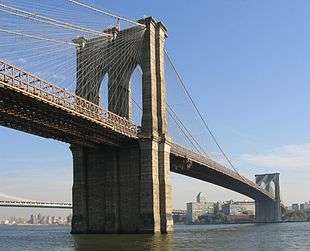Boerum Hill

Boerum Hill is a small neighborhood in the northwestern portion of the New York City borough of Brooklyn, bounded by Schermerhorn Street to the north and Fourth Avenue to the east.[1] The western border is variously given as either Smith or Court Streets, and Warren or Wyckoff Streets as the southern edge.[2]
Smith Street and Atlantic Avenue are the neighborhood's main commercial districts.[3] The Brooklyn High School of the Arts is located in the neighborhood on Dean Street and Third Avenue. The neighborhood is part of Brooklyn Community District 2 and is served by the NYPD's 84th Precinct.[4]
History
Boerum Hill is named for the colonial farm of the Boerum family, which occupied most of the area during early Dutch settlement. Most of the housing consists of three-story row houses built between 1840 and 1870. Despite the "hill" in the name, the neighborhood is flat, parts sit atop former marshes that bordered Gowanus Creek. In the 1950s, all the neighborhoods south of Atlantic Avenue and west of Prospect Park were known generically as South Brooklyn. Boerum Hill in particular was sometimes called "North Gowanus." The name "Boerum Hill" was coined in early 1964 by Helen Buckler, referencing name of the colonial farmers.[5][6][7]
From the early 1970s till about 2003, Boerum Hill was populated mostly by working class and middle-class families. Crime was fairly common and it had one of the highest crime rates in the city because of its small size. In recent decades, since about the late 1990s, gentrification has restored the neighborhood to one of mostly upper-class families, though working class individuals still reside in the immediate area.
In the early twentieth century, many of the buildings were run as boarding houses. Nearby was the union hall for ironworkers, who came to the city to work on bridges and skyscrapers.[8] The north end of Smith Street was the center of New York City's Mohawk community, who came mostly from Akwesasne and Kahnawake, Mohawk reserves in Quebec, Canada.[8] (Akwesasne extends across national boundaries into New York state.) Many of the Mohawk men were ironworkers, while their wives worked at a variety of jobs and created the community for their families. For 50 years, the Mohawk families called their neighborhood "Little Caughnawaga," after the homeland of Kahnawake. Many families would travel back to Kahnawake in the summer.[9]
The Boerum Hill Historic District was listed on the National Register of Historic Places in 1983. Many of its buildings are land marked.[10]
Culture

Boerum Hill is known for its independent boutiques, restaurants and rows of brownstones. Boerum Hill is home of many artists who own art galleries in the neighborhood, including the "invisible dog" exhibition. Boerum Hill is home to many young families, and biking is popular in the neighborhood and nearby Prospect Park. The abundant cultural offerings (including The Invisible Dog Art Center, Roulette, Issue Project Room, and BAM), the thriving Smith Street restaurant row and Atlantic Avenue Design district.
The neighborhood has been featured in several contemporary creative works. It is the setting of Spike Lee's movie, Clockers (1995), which was filmed in the Gowanus Houses. It is the setting for two of Jonathan Lethem's novels: Motherless Brooklyn (1999), a crime mystery set on Bergen Street between Smith and Hoyt streets; and The Fortress of Solitude (2002), set primarily on one block in Boerum Hill (Dean Street between Nevins and Bond streets).
Media
WBAI 99.5 FM, a non-commercial, listener-supported radio station part of the Pacifica Network has studios and offices at 388 Atlantic Avenue.
Notable natives and residents
- Lana Parrilla (born 1977), actress
- Jean-Michel Basquiat (1960–88), artist
- Ethan Hawke (born 1970), actor
- Jonathan Lethem (born 1964), writer, lived here as a child[11]
- Heath Ledger (1979–2008), actor
- Emily Mortimer (born 1971), actress
- Alessandro Nivola (born 1972), actor
- Sandra Oh (born 1971), actress
- Keri Russell (born 1976), actress
- Michelle Williams (born 1980), actress
- Chuck Klosterman (born 1972), writer
- Joan Osborne (born 1962), singer-songwriter
- Jonathan Ames (born 1964), author
References
- ↑ Boerum Hill Association
- ↑ NYC Dept. of Housing and Preservation. "New York City Neighborhoods – Boerum Hill". NYC.gov. New York City. Retrieved 11 January 2013.
- ↑ New-York Historical Society (1995). Jackson, Kenneth T., ed. The Encyclopedia of New York City. New Haven: Yale University Press. p. 123. ISBN 0-300-05536-6.
- ↑ 84th Precinct.
- ↑ "Reporter at Large: The Making of Boerum Hill," The New Yorker, November 14, 1977. pgs 105–106
- ↑ Osman, Suleiman (2011). The Invention of Brownstone Brooklyn. Oxford University Press. p. 352.
- ↑ Gillison, Douglas (March 11, 2003). "Close-Up On: Boerum Hill". The Village Voice. Retrieved August 22, 2009.
- 1 2 Duffy, Peter (July 18, 1999). "Remembering Mohawk Ironworkers' Urban Haven". The New York Times. Retrieved August 22, 2009.
- ↑ Article about Reaghan Tarbell and her documentary, To Brooklyn and Back: A Mohawk Journey, PBS, 2 November 2009, accessed June 2010
- ↑ National Park Service (2009-03-13). "National Register Information System". National Register of Historic Places. National Park Service.
- ↑ McGlone, Jackie. "Brooklyn dodger", The Scotsman, 2007-05-26. Retrieved on 2007-08-29
Further reading
- Article about Reaghan Tarbell, To Brooklyn and Back: A Mohawk Journey, PBS, 2 November 2009, documentary about Kahnawake Mohawk families in Brooklyn
External links
-
 Media related to Boerum Hill at Wikimedia Commons
Media related to Boerum Hill at Wikimedia Commons
 |
Brooklyn Heights | Downtown Brooklyn | Fort Greene |  |
| Cobble Hill | |
Prospect Heights | ||
| ||||
| | ||||
| Carroll Gardens | Gowanus | Park Slope |
Coordinates: 40°41′06″N 73°59′04″W / 40.68500°N 73.98444°W

